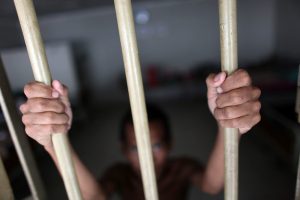Yesterday brought the horrific news that a fire had killed 41 inmates at an overcrowded prison block in Banten province, outside the Indonesian capital Jakarta. According to police, the fire broke out at 1.45 a.m. local time in Block C of Tangerang Prison, and was extinguished after a few hours.
But by that time, it had killed 41 people and injured at least 80 more, Indonesian law and human rights minister Yasonna Laoly said in a statement after visiting the grisly scene.
“We’re working together with relevant authorities to look into the causes of the fire and of course formulating prevention strategies so that severe catastrophes like this won’t happen again,” Yasonna said. The cells were locked at the time, he added, and as the fire grew out of control, “some rooms couldn’t be opened.”
Jakarta Police Chief Fadil Imran told reporters that the cause of the blaze is still being investigated, but that a preliminary investigation pointed to a short circuit in one of the block’s cells. Among the dead were two foreigners from South Africa and Portugal.
The fire, Indonesia’s deadliest since 47 perished in a firework factory disaster in 2017, highlights the poor conditions and severe overcrowding of Indonesia’s prison system. One official from the Justice Ministry told Sky News that Tangerang Prison was designed to house 1,225 inmates but has more than 2,000. Another official said that Block C, where the fire broke out, had 122 people pressed into a block built to hold 38.
Indonesia’s prison overcrowding problem stems from the twin problems of inadequate funding and highly punitive anti-drug campaigns that have flooded the prison system with detainees, many of them on non-violent offenses. As of March 2020, the country had almost 270,000 inmates, more than double its total capacity of 133,000, making jailbreaks and riots a common occurrence.
The overcrowding situation in neighboring countries is even worse. Thailand, Indonesia, and the Philippines are among the top 10 nations with the largest prison populations, according to the Institute for Crime and Policy Justice Research. Three nations – the Philippines, Thailand, and Cambodia – are among the top 10 nations with the most overburdened prison systems in the world, while Indonesia ranks 22nd out of 2016 nations.
The Philippines’ prison system is the world’s second most congested after the Republic of the Congo, with its capacity at 464 percent. Meanwhile, Thailand has 311,000 or so inmates incarcerated in 143 correctional facilities nationwide with an official capacity of 110,000, according to the country’s Department of Corrections. (These figures were from December 2018.) Cambodia’s prison system is 354 percent over its official capacity.
Unsanitary and densely packed penitentiaries have also been a gift to the novel coronavirus, which has already wreaked havoc in several nations’ prison systems. In the early months of the pandemic, Human Rights Watch said that “a major crisis” was brewing in Asia’s prisons due to overcrowding.
Sure enough, as the Delta strain of COVID-19 surged in Thailand earlier this year, its prisons were epicenters of the virus. In May, the Thai government announced that nearly 3,000 inmates at two prisons in Thailand’s capital had tested positive for COVID-19, later prompting the Thai government to release inmates in order to reduce the pressure on the system. Around the same time, Cambodia also saw outbreaks of COVID-19 in its prisons.
Despite the severity of the overcrowding problem in some Southeast Asian nations, this is a rare problem that is amenable to a relatively straightforward solution. Funding shortfalls can’t often be quickly bridged, yet prison authorities can quite easily release people convicted of non-violent drug offense – or better yet, refrain from imprisoning them in the first place.

































